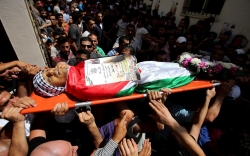The unanimity of Israeli condemnation of last week’s arson attack that killed Palestinian toddler Ali Dawabsheh has been nothing short of remarkable, in a society where mainstream attitudes towards Palestinians are at best indifferent. Denunciations have come not only from centrist elements appalled by the Dawabsheh murder and the stabbing death of 16-year-old marcher Shira Banki at a Jerusalem gay-pride march last week, but also from right-wing politicians associated with the settler movement.
Education Minister Naftali Bennett called the Dawabsheh killing “sheer terrorism and murder,” while the settlers’ Yesha Council declared itself “shocked and appalled.” President Reuven Rivlin, a stalwart of Prime Minister Benjamin Netanyahu’s nationalist Likud party, even raised the issue of growing racism in Israeli society. “There is an atmosphere of forgiveness toward so-called rotten apples,” Rivlin told a rally on Jerusalem’s Zion Square. “Every society has its marginal extremists. Yet we must ask ourselves — what is it about the public atmosphere allows these extremists to walk the main road?”
The consensus of condemnation of last week’s murder in the West Bank was even stronger than the reaction that followed last summer’s killing of Palestinian teenager Mohammed Abu Khdeir near Jerusalem. But that had come on the heels of the abduction and murder of three Israeli teenagers; the murder of Dawabsheh could not be credibly claimed by anyone as “revenge” for any particular violence against Israelis.
Still, while the revulsion may be genuine, it appears to owe more to the details of this particular crime than to any wider concern for Palestinian lives. There was no such outpouring of condemnation over the Palestinians killed in the week before, or the days since Friday’s firebomb attack. And for the state, the primary concern is the need to preserve its monopoly on the use of force against Palestinians. Israel’s security establishment needs to control the temperature of the conflict, rather than allow confrontations initiated by citizen radicals to escalate into crises.
The revulsion is less universal than it might appear. Rivlin’s comments provoked such a deluge of death threats that the president’s office lodged formal complaints with police. A survey released some weeks before the attack showed only 28 percent of Israeli teenagers under 18 condemning “price tag” attacks — the term used by settlers for attacks on random Palestinian civilian targets in “retaliation” for Israeli policies they reject. Alarmingly, more than half of the young respondents actually supported such attacks.
The Israeli human rights organization B’Tselem has pointed out that before the Dawabsheh killing there were numerous “price tags” attacks that came close to claiming Palestinian lives. On these occasions, the targeted house or car happened to be empty, or the occupants escaped in the nick of time. The Dawabsheh family was just less fortunate.
The Israeli state also claimed the lives of hundreds of Palestinian children during last summer’s military campaign in Gaza, without prompting any domestic criticism outside of the political left. Those young Palestinians were as innocent as Dawabsheh, but they were killed by forces of the state carrying out a military campaign — and it’s that distinction that Israeli officials now seeks to restore, in order to preserve whatever control the state has over the intensity of the Israeli-Palestinian conflict.
More than a decade since emerging largely victorious from the Second Intifada, Israeli forces have grown accustomed to controlling the height of the flame in the conflict. Large swaths of the West Bank are policed by the Palestinian Authority, which coordinates with Israeli intelligence to restrain those under its control from attacking Israel. Gaza is contained in the vise grip of an Egyptian-Israeli siege, and escalations, when they occur, are usually accompanied by intense indirect negotiation on the next cease-fire.
Last summer’s war in Gaza was an exception, sparked by actions carried out by a handful of individuals — Palestinians and Israelis — who on their own initiatives launched gruesome attacks. That war lasted much longer than usual engagements, drew Israeli ground forces into combat, cost many more lives than anyone anticipated at the outset and raised international pressure on Israel. It also weakened the Hamas regime in the territory — a government Israel is eager to preserve, lest it be replaced by an Islamic State in Iraq and the Levant (ISIL) offshoot or worse. Israeli security chiefs fear that the Dawabsheh killing could spark a spontaneous, Palestinian retaliation at the grassroots, followed by a grassroots Israeli one, followed by war.
Israel’s goal, then, remains containment. Its first measures in response to the attack were not to counter the racist incitement that President Rivlin himself said had paved the way for the killings, or to even consider addressing the context of occupation and segregation in which the killings occurred. Rather, it was taking one of the most undemocratic tools of the Israeli occupation of the West Bank — administrative detention without trial or counsel — and vowing to apply it to the suspected culprits in the Dawabsheh case and other right-wing activists suspected of planning to carry out similar attacks.
Putting aside the fact that denial of due process reduces, rather than increases, the odds of establishing a suspect’s guilt beyond reasonable doubt, the move also focuses on symptoms rather than causes. The alienation, racism and fear permeating that segment of Israeli society driven to murder random Palestinians are unlikely to be sufficiently contained by security measures to prevent the next attack.
Protests erupt across Palestinian territories after attack in Duma leaves child dead, young family struggling to survive
Meir Ettinger arrested for involvement in ‘extremist Jewish organization’ after fire that killed Palestinian child
Government under pressure to crack down on violent Jewish groups after arsonists killed a Palestinian toddler
In response to perceived moves against Jewish settlements in the West Bank, nationalists conduct ‘price tag’ attacks











Muhammad Abu Latifa is the fourth person to die during Israeli operations this month
Error
Sorry, your comment was not saved due to a technical problem. Please try again later or using a different browser.